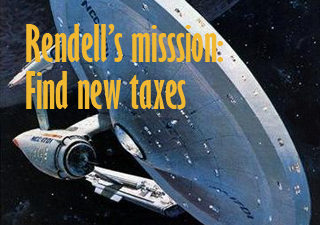Commentary

Rendell’s Higher Taxes Equals Fewer Jobs
Pennsylvania’s latest budget shortfall is the result of a pattern in which state legislators abandon fiscal prudence in “good years” and face spending cuts or tax hikes in down times. Indeed, Gov. Rendell has proposed massive spending increases with each of his budgets, usually requiring new or higher taxes. This year he is pushing for combined reporting to close “tax loopholes” for businesses, taxing cigars and smokeless tobacco, a new tax on natural gas, and expanding the Sales and Use Tax.
Combined reporting is not a new idea in the Commonwealth, having been discussed in one form or another since 2003. It treats companies and their subsidiaries as a single entity for the purpose of determining taxable income, regardless if they have operations in Pennsylvania.
The arguments for combined reporting are that some businesses in Pennsylvania are not paying their “fair share,” and the state needs to put an end to legal tax avoidance strategies. The Commonwealth already has the highest Corporate Net Income Tax rate in the world, at 41.5 percent (when both federal and state taxes are counted). Our businesses also pay one of the highest capital stock taxes in the nation, and Pennsylvania is one of only 10 states to impose such a tax.
These policies discourage job creators from coming to Pennsylvania and push jobs out of the state. The data confirms this, as the Commonwealth ranks 45th in job growth (since 1990) and lost 56,000 net residents from 2000 to 2008. The proposal to extract more revenue from already over-burdened businesses would only further drive employers and drive jobs to other states.
Likewise, a natural gas severance tax would discourage investment in the state. Pennsylvania has immense natural gas reserves in a geologic formation known as the Marcellus Shale. The industry is growing rapidly. A Pennsylvania State University study indicates the impact of drilling in the Marcellus Shale region will create more than 107,000 jobs and generate more than $800 million in state and local tax revenue in 2010 and could exceed $1.4 billion a decade from now.
The increased tax revenue, though, is entirely from secondary sources such as payroll and sales taxes, rather than a severance tax. Drilling companies already pay the Corporate Net Income Tax or Personal Income Tax, the Capital Stock and Franchise Tax, leasing fees, and 18 percent royalties. A recent lease of state lands in the Marcellus Shale also generated $128 million, twice what was expected.
Rendell also wants to tax tobacco products at 30 percent of their wholesale value. Pennsylvania remains the only state that does not tax smokeless tobacco and one of only two that does not tax cigars. The tax will little affect large tobacco companies, at which the tax is aimed; rather, it would harm small tobacco farmers in Pennsylvania. According to the U.S. Department of Agriculture, tobacco is grown on small farms in Pennsylvania, as nearly 1,000 tobacco farms in the state have an average of 6.1 acres.
The tax comes at a time when the tobacco industry is growing rapidly. Tobacco production from Pennsylvania family farms increased over 100 percent, to a value of $31.5 million, from 2005-2009. A new tax on smokeless tobacco will hurt tobacco-growing families the most, many of whom are Amish and Mennonite.
Rendell also wants to lower the Sales and Use Tax rate from 6 to 4 percent, while expanding the tax to a number of currently exempted goods and services. The Sales and Use Tax will now be expanded to cover advertising, truck transportation, and business services (which may result in double taxation for some final goods). The list of exemptions Rendell wants to repeal is large enough that, even with the lower rate, residents will pay $531 million more in taxes next fiscal year, and close to $1 billion over a full year. Consequentially, the increased tax will add to the cost of doing business, raise consumer prices, and will reduce employee benefits and jobs.
Gov. Rendell has a one-dimensional view of how the economy works. He assumes tax hikes will increase revenue. But the economy is more dynamic than Gov. Rendell realizes. People and businesses change behavior in response to higher taxes by reducing spending, not hiring workers, and moving to other states-which hurts both the state’s economy and tax collections.
The solution to our budget mess is not higher taxes, but lower spending and creating a tax climate that is friendly to business. This is what will lead to a thriving economy.
# # #
Abhilash Samuel is a Research Associate at the Commonwealth Foundation (www.CommonwealthFoundation.org), a public policy education and research institute located in Harrisburg.